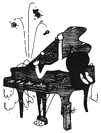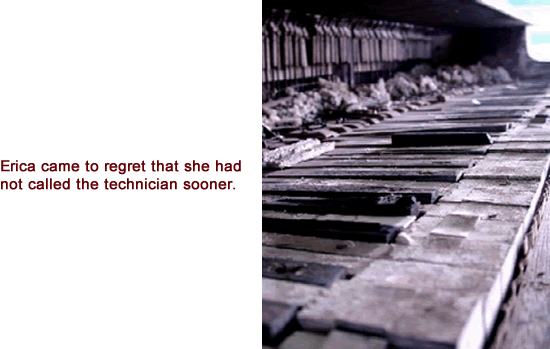Choosing a Piano
Purchasing a piano is a big investment. If the instrument is properly cared for, though, it will last for many generations. Choosing a piano is a personal matter. Each family must consider their budget, the space they have available, and the music that will be played on it. (More advanced pianists will benefit greatly from playing on a finer instrument.)
There are many good pianos available. Watch the classified ads, and shop at local stores for both new and used pianos. If expense is an obstacle for your family, you might want to lease a piano instead of purchasing one. Always PLAY the pianos you are considering (no EBay purchases allowed)! It is very likely that you will eventually find one that pleases you and your pianist. You should like the way it looks (because you will have to look at it a lot) but MOSTLY you should like the tone it produces, and you should like the way it feels to play. Think about what it will sound like in your home. If the sound is too bright, it could become irritating in a smaller space. Generally pianos with a warm, mellow sound are the most pleasing to have at home.
I highly recommend that you hire a piano technician to come with you to inspect any used instrument you might be considering. A technician can tell you about how different makes tend to hold up. They can also look at a specific instrument and tell you what maintenance issues need to be addressed right away, and what you might be able to expect down the line.
Maintaining Your Piano
IT IS VERY IMPORTANT FOR EVERY PIANO STUDENT TO HAVE A WELL-MAINTAINED PIANO ON WHICH TO PRACTICE! I cannot stress that enough. Practicing on malfunctioning instruments (e.g. keys that stick or don't play or a pedal that is not adjusted properly) can cause a student to develop bad habits that are difficult to correct. Playing on an out-of-tune instrument is detrimental to developing a good musical ear and sense of pitch. If you have a new piano, PLEASE get it tuned about four times during the first year you own it. After that, twice a year is usually sufficient (but trust your ears)! A good time to call your technician is after the heat has come on or gone off in your home after a change of season.
I highly recommend the addition of a damp chaser system to regulate the humidity around your piano. It helps to stabilize the instrument in every way. It will hold its tune longer and will mechanically function well without regulation longer. Your technician can give you more information about damp chaser systems.
As for external care, polish the case with Guardsman. The keys need only to be wiped with a damp cloth. If you have ivory keys, the surfaces will come off from time to time and can be replaced with a little super glue. Never place your piano near a heat duct. Place it away from direct sunlight or simply draw the curtains or shades when necessary. Your piano will thank you!
A Work About Keyboards
A keyboard can be a fun and practical addition to owning a piano, but it is no substitute. Although there are obvious similarities between the two instruments, they are completely different in terms of how they produce sound. A pianist needs to learn how to regulate the tone of a piano in a way that cannot be learned on a keyboard.
That said, there are several reasons why a keyboard could be useful to you:
- if you have a child who is just beginning with piano lessons and you want him/her to practice on the keyboard you have for a few months to see if the investment in a piano will be worth it!
- if you travel a lot and want to have an instrument that can be taken with you
- if you are primarily interested in rock music, or any other genre of music for which keyboard would be your primary instrument
- if you would enjoy the technological aspects of a keyboard (e.g. practicing sometimes with pre-programmed back beats, pre-recording the OTHER person's part to a duet you are learning so you can practice with it, recording your own playing, using the built-in metronome, composing and recording your own music, using the different sounds available to orchestrate your pieces)
I am sure there are lots of other ideas, but these are the ones that come to mind for me. |








